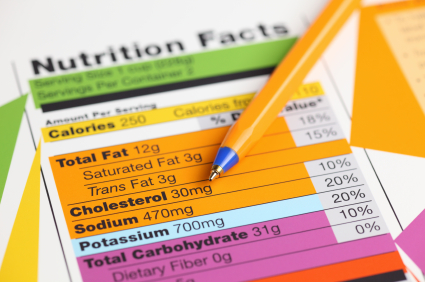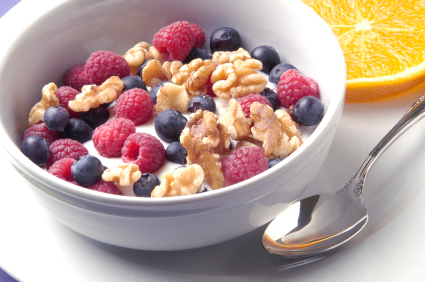Here's some of the nutrition advice for parents we got from a panel of guest nutrition bloggers on how to keep their kids well nourished for sports and school:
No magic bullet - following lifestyle habits is key
Valerie Berkowitz says that "there is no magic bullet when it comes to giving your child the competitive edge in sports, but following 5 key lifestyle habits will help make the difference:
- Adequate hydration before, during and after work outs ( 20 oz. water 2.5 hours before exercise, 10 oz. 15 minutes before exercise, 8 oz. for every 15 minutes of physical activity and continue drinking water throughout the course of the day)
- Electrolyte balance;
- Adequate balance of energy intake & micronutrients. Use common sense, know what you and your children are putting into your bodies. Do not fall for marketing strategies that hook you and draw you in. Read labels. Look at the ingredient section to identify what you are really eating.

- Anti-oxidant intake through eating a variety of fruits and vegetables and basic supplementation (Multivitamin/mineral (MVI) to ensure the basic micronutrients are met (teenage girls who do not eat red meat should consider a MVI with iron); Omega 3 fish oil helps support focus, reduce inflammation and much much more; Calcium with magnesium, Vitamin D, boron, Vitamin K supports growth and strength for bones; Greens: drink to reduce the oxidation associated with exercise, increase nutrients similar to vegetable intake.
- Sufficient sleep. Rest, relaxation and sleep are critical elements to rejuvenate the muscles and hormones that need to work at peak performance during games and major events. Spending time in a warm bath, creating time to read in bed at the end of the day, ensure sleep duration matches age-appropriate recommendations are just a few things that support work-out recovery
Set the right example
Patty James says that "The most important nutrition tip is you setting a good example for your kids. If you're telling your kids to eat their veggies, get their exercise, turn off the television and go to bed early while you shun broccoli, love the couch and never miss a rerun of Seinfeld, your kids probably won't listen. Get them excited about health and fitness by being a role model. Let your kids see you go for a walk or run, head to the gym or play. basketball. Turn off the television and choose activity instead. When your children see you making healthy choices -- eating that broccoli -- they will too. If you've spent your life making poor health choices and your kids have watched, it may take some time and convincing to show them the way, but the extra effort is worth it--keep at it!
Resist, insist, persist
Leslie Bonci says "Food is more than what is on the plate or in the glass, it is when, where and how much you eat!" Leslie urges parents to be their child's nutrition coach, and to remember:
If you resist, don't expect your kids to care about what they eat.
If you insist, your kids will start to make healthy eating a priority
If you persist, your kids will perform well in the classroom as well as the playing field, and they'll be healthier too!
Don't skip breakfast!

have parents paying for extra training and conditioning and the kids aren't eating breakfast. In addition, most of them were sleeping less than eight hours a night. They didn't understand the urgency of maintaining a schedule of meals and snacks for proper fueling and recovery, the necessity of adequate hydration before, during and after training and competition, and the importance of proper rest and sleep. These are the pillars of successful training. and, after talking with the boys, I couldn't believe how prevalent their erratic eating habits actually were! Here we
Treat body as high performance machine
Brad Taliancich says "Parents need to realize that proper nutrition has a lot to do with their child's performance. Today, we see young athletes in specialized training programs, programs aimed at helping the athlete reach higher levels of competition and excellence, but still proper nutrition is neglected. Nutrition is fuel for the body and must be treated as such. A high performance vehicle does not perform well with low-grade fuel. Treat the body as a high performance machine."
Different nutrition rules for kids
Jill Castle reminds parents that "the nutrition rules for adults don't necessarily apply to kids. In fact, much of what we know about kids and sports nutrition is adapted from adult studies. Because kids and teens are still growing, their nutritional needs are influenced by growth and sport, something that needs careful attention.
Get kids to try new foods
Allison Maurer has four nutrition tips for parents:
- At a young age, more is not better.
- Kids don't dehydrate like adults, so don't encourage sports drinks at a young age. Stick with water.
- Gaining weight will happen during puberty, so don't give your kids what they want all the time.
- Make them try new foods, and if they don't like it, try it again another time. This may not be sports-related but from the time kids are very young, they know what they can get away with. Allowing them to make all the food choices at a young age is detrimental to their sensory development and their ability to experiment with foods. When they are in high school, they should not still be ordering chicken tenders off the kids menu at a Mexican restaurant!
Don't forget lunch!
Martha McKittrick writes that "One area that may be overlooked is that your child may be eating less at lunch than you think. This will affect his/her energy levels for the rest of the day, as well as at practice/games. I've had quite a few kids tell me they dislike the lunches served at school, and barely eat anything. To make matters worse, some kids have lunch periods at 11 am or earlier! How are they supposed to function for the rest of the day, let alone have enough energy for a 2-hour practice after school? I also find that some of my teen female clients aren't eating much at lunch due to peer pressure and the dieting mentality.So make sure you know when and what is being consumed at lunch.









